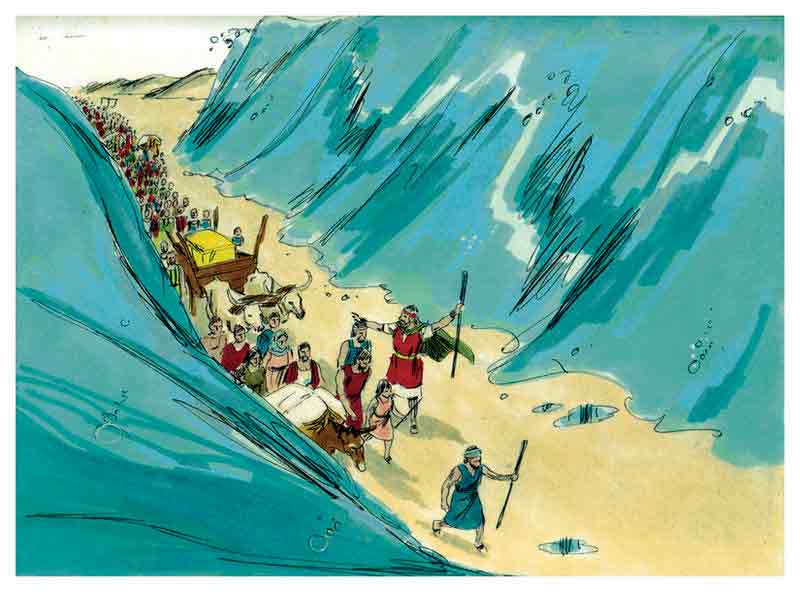
An extremely significant step towards making Israel a single nation, an integrated whole had made its mark – the people now had a competent central leadership, their ‘first king’ – a need they had so intensely felt all along, was fulfilled.
Soon, the training of the newly appointed king was underway and under the supervision of Samuel. While on the one hand he imparted guidance about how the king ought to conduct himself, he explained to Saul, the duties of the king on the other. More importantly, Samuel drove home to Saul, the value that ‘the king would, all said and done, remain a server of God and would adorn the throne of the kingdom that belonged in fact to God. And so, he would govern it but in the role of a custodian. Moreover, he would treat the Israelites as his brothers, his equals and never allow any pompous arrogance of a ruler to come in the way of his interaction with them.’ Moreover, while dissuading the Jewish community from bringing on a monarchy, Samuel had pointed out in all earnest that ‘they, the Jewish community did not actually require a king. It was God who was their king in any case’, which was also the reason behind this teaching. Also, though God did go on to grant to the Israelites, their prayer for a king, He was not really too pleased with it, says the story.
Samuel also instructed Saul that ‘the king constantly carry on his person, the sacred ‘Torah’ – the supreme law of God, regularly read and study it and respecting its teachings, sincerely try to imbibe them as much as possible in his life’.
Saul gradually picked up the nitty-gritty of administration. And the moment that put to test, the single most crucial reason behind wanting a king, viz. ‘protecting the Israelites from foreign invaders’ was not too far away. With the intention of estimating the capacities of the newly appointed king, Nahash, the king of the neighbouring kingdom of Ammon invaded the Israelites and laid a siege to their town of Jabesh-Gilead. He assured the Israelites of life on condition that ‘every single one of the citizens of the town allowed one of his eyes to be gouged out. The Israelites would in any case have to live as slaves of the Ammonites.’
Messengers secretly met Saul to convey the news. The blessed Saul felt his rage rising as he heard the humiliating condition Nahash had laid down. Right away he sent his messengers in the entire land of Canaan. They had a downright warning to convey to the Israelites. ‘The one who refrains from supporting or from standing by his fellow Israelites will have his pack of animals killed’. In the course of his tours across the land, Samuel had already brought about considerable awakening and awareness among the people. The warning had precisely the intended effect and within a matter of a night, 350 thousand able Jewish warriors gathered in Bezek. That very night Saul ordered an invasion on the Ammonites for whom it was absolutely a jolt out of the blue. Not at all prepared for this attack, the Ammonite army was routed.
As a result of this victory, Saul consolidated his position as ‘king’. Around this time, the Philistines ruled over most of the land of Canaan and oppressed the local Jewish people by levying annual taxes.
The Philistines had appointed an officer to oversee the administration in the land. He was so stern that he forbade the Jewish community from possessing any kind of weapon lest they rose up in rebellion. Also, they were compelled to buy their farming tools from a certain approved Philistine supplier and the tools were meticulously inspected before they were handed over to them. Saul naturally found it intolerable that the oppressive Philistines should rule over a large section of Canaan and set himself the goal of liberating Canaan from the Philistines.
It so happened that the opportunity presented itself and very soon. Saul’s son Jonathan fought extremely valiantly and triumphed over the Philistine army. The stern Philistine officer was killed in this battle. Enraged, a huge Philistine army armed with about 30 thousand iron chariots and an infantry numbering more than 6 thousand, attacked the Israelites.
The news of an invasion by that enormous an army gave cold feet to some from Saul’s camp and they fled in fear.

Though Saul was eager for a chance to attack the Philistines, Samuel had clearly instructed him to refrain from making any move until he (Samuel) returned. So Saul had no option but to wait. Seven days passed by but there was no sign of Samuel. The Philistine army was fast advancing and in fact very close by then. Losing heart in the circumstances, many more from the Jewish camp fled and hid in the hilly regions and valleys. Saul was now left with a mere six hundred faithful soldiers with whom he was only too impatient to launch an attack on the Philistines. Moreover, with every passing moment he feared losing more soldiers from those who had stayed on.
Ultimately, Saul could take it no more. He lost his patience and he ended up disobeying Samuel. Any battle or mission of the Israelites was necessarily preceded by prayers unto God, offerings and seeking God’s blessings for victory – all performed by the high priest. Saul, anxious and impatient was unwilling to wait for Samuel and so he performed all these rituals, assuming the role of high priest. Samuel returned while this ritual was underway and lost his temper. “You have disobeyed God because it was on his instructions that I had told you to wait until I returned. It was in accordance with God’s wish that the throne of Israel came to your lot and so it will soon be taken away from you” he foretold in a fit of fury.
Saul realized his mistake and with it, its consequences as well! Considering the level or extent to which Saul had evolved and the kind of height he had attained spiritually and morally, tough tests were justified and commensurate with his stature. Calm and composed, Saul admitted his mistake and accepted Samuel’s prophecy too.
Jonathan, Saul’s son, was watching the events that unfolded before him. Although their army was way smaller than the enemy’s threatening to push the situation to despair and although the Jewish people’s courage was beginning to dwindle, Jonathan’s faith in God remained staunch and unwavering. He had heard from his forefathers that in similar circumstances in the past, i.e. when the Israelites were inadequate in any way whatsoever, God had intervened owing to which they had attained victory. He was certain it would happen this time too. In the dark of the night, he set out secretly, accompanied but by a faithful soldier along slippery path of the hills. Taking the Philistine army posted there by surprise, they waged an attack and wiped out the entire battalion.
When the Philistines realized what exactly had happened, God alone knew how and why but they were consumed by an inexplicable fear and began to behave as if insane, so the story says.
On learning about it, Saul decided to attack them and he went all out in his effort. Those who had deserted their fellow Israelites came out of their hiding places in the hilly regions and re-joined the army. Saul’s army swelled in number and defeating the Philistines, followed them in hot pursuit. Saul’s men chased them through the day and ended up slaying many a Philistine soldier. They chased the remaining Philistines out of Canaan, thus liberating the land from the clutches of the Philistines. (To be continued…)












